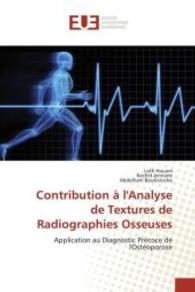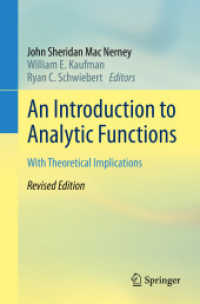- ホーム
- > 洋書
- > ドイツ書
- > Humanities, Arts & Music
- > Philosophy
- > miscellaneous
Description
A: The brief description of the contents of the book :The collection of papers assesses the impact of the reception of Averroist ideas on philosophy between the 15th and 17th century in the Latin West. Most of the articles in the volume were presented at the conference "Averroism between the 15th and 17th century," which was held on 9th -10th November, 2016 by the Department of Philosophy, Faculty of Arts at Palacký University, Olomouc, the Czech Republic. The contributors explore the influence of Averroes, identify the difficulties in the interpretation of his works, and study his followers and critics in the Latin, Hebrew, and Byzantine traditions.B: a brief self introduction of you as editor:Jozef Matula teaches Medieval and Renaissance philosophy at Palacký University in Olomouc, the Czech Republic. His research focuses especially on epistemology and psychology in Late Medieval Latin and Byzantine Philosophy (Thomas Aquinas, Plethon, Bessarion) as well as on Renaissance philosophy (Marsilio Ficino, Leone Ebreo, Agostino Nifo) and history of tolerance (12th-17th century). ContentPrefaceThomas Leinkauf: Ficino und Averroes. Ein vorläufiger Kommentar zu Ficinos Auseinandersetzung mit Averroes im Buch XV der Theologia PlatonicaOvanes Akopyan: One More (Unsuccessful) Reconciliation: Giovanni Pico della Mirandola on Averroes and Islamic PhilosophyJozef Matula: Echoes of Averroes in Renaissance Platonism: Cardinal BessarionAnna-Katharina Strohschneider: Metaphysics Last: Agostino Nifo on Averroes, Avicenna, and the Order of the Theoretical SciencesLeen Spruit: Eclectic Universalist Noetics and its CriticsYehuda Halper: Is Silence Praise to Thee? On the Remarkable Near-Absence of Hebrew Averroist Metaphysical Speculation about God in the 15th-16th CenturiesSalvatore Carannante: "The intelligence that illuminates all of us". The Presence of Averroes in Bruno's doctrine of IntellectOlivér István Tóth: Spinoza's theory of Intellect - an Averroistic Theory?Index of Names








